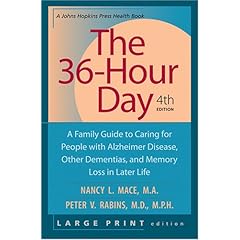What would you say is the biggest barrier you have faced as a caregiver?”
Though the respondents’ language varied, a computer analysis found that more than 80 percent of them touched on a common theme: “letting go of the person we used to know,” as one person wrote, or “watching your loved one slip away and forget who people are.”
 The hardest part of caring for loved ones with Alzheimer’s-type disorders is not the everyday practical challenge, but rather the emotional impact of losing the patients’ support and companionship as the disease robs them of their faculties, according to new research at the University of Indianapolis.
The hardest part of caring for loved ones with Alzheimer’s-type disorders is not the everyday practical challenge, but rather the emotional impact of losing the patients’ support and companionship as the disease robs them of their faculties, according to new research at the University of Indianapolis.“You are losing and grieving while you’re providing the care, because Charlie isn’t Charlie anymore,” says Associate Professor Jacquelyn Frank of UIndy’s Center for Aging & Community. She says the results point toward new avenues of service that could be provided by community-based support agencies.
Frank gathered responses from more than 400 dementia caregivers around Indiana, most of them spouses and adult children of Alzheimer’s patients. She is continuing to analyze data from the survey’s 100-plus items, but she was struck immediately by the responses to this open-ended question: “What would you say is the biggest barrier you have faced as a caregiver?”
Though the respondents’ language varied, a computer analysis found that more than 80 percent of them touched on a common theme: “letting go of the person we used to know,” as one person wrote, or “watching your loved one slip away and forget who people are.”
The comments illustrate two previously noted but seldom-studied phenomena seen in those caring for the terminally ill. “Anticipatory grief” is the pain of losing a loved one, felt in advance of the patient’s death. “Ambiguous loss” is the discordant feeling that comes from interacting with a patient who is physically alive but no longer seems present socially or psychologically.
It’s not surprising that such effects would be common among dementia caregivers, but this study is among the first to document their prevalence.
“The fundamental barrier experienced by Alzheimer’s caregivers appears to be a combination of anticipatory grief and ambiguous loss, rather than hands-on care issues,” Frank says.
The survey that is central to the study was administered at public events and through the assistance of the Greater Indiana Chapter of the Alzheimer’s Association. Most responses to the “biggest barrier” question fell into five categories, including:
* the patient’s difficult behavior and need for hands-on care
* shortfalls in community and financial support
* difficulties in communicating with the patient, other relatives and medical professionals
* the caregiver’s loss of personal time and freedom.
The overwhelming sentiment among the respondents, however, involved the personal grief and loss they were experiencing in the midst of their many practical concerns. To Frank’s surprise, many respondents sent personal notes and letters along with the questionnaire, noting that they appreciated the opportunity to bring their feelings into the open.
Frank hopes the study results can be used to help design new support and intervention programs for dementia caregivers. Even friends and family don’t always understand that dementia poses unique challenges, she says, and that adds to the sense of isolation and hopelessness many caregivers already feel.
“These people need to know that feelings of grief and loss are normal, and that other caregivers face the same emotional difficulties,” Frank says.
About the Center for Aging & Community
Founded in 2001, the University of Indianapolis Center for Aging & Community is one of Indiana’s leading centers for aging studies, with an interdisciplinary approach to developing partnerships between higher education, business organizations and community groups. CAC advances the new reality of older adults as corporate, community and family assets and also provides graduate-level education in gerontology, offering both a master of science degree and a graduate certificate.
To schedule media interviews with Jacquelyn Frank, Ph.D., call (317) 371-5240.

The 36-Hour Day: A Family Guide to Caring for People with Alzheimer Disease and Memory Loss in Later Life